Foreign Minister Claims Iran ‘Completely Safe’ For Tourists
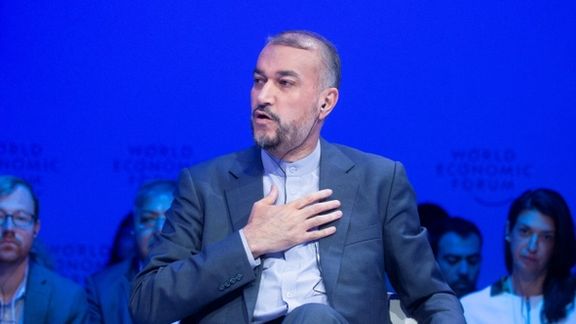
After Tehran exchanged Western hostages with its convicted diplomat, Foreign Minister Hossein Amir-Abdollahian claims Iran is "completely safe" for tourists.

After Tehran exchanged Western hostages with its convicted diplomat, Foreign Minister Hossein Amir-Abdollahian claims Iran is "completely safe" for tourists.
He wrote on Twitter Saturday that “if some European citizens are not exploited by foreign security services, there is no reason to arrest them.”
Over the years Iran has detained and accused dozens of Western visitors of espionage, while using them effectively as hostages to squeeze concessions from the West. Detainees do not receive fair legal protection and face sham trials.
On Friday, two Iranian-Austrian citizens named Kamran Qaderi and Masoud Mosaheb and a Danish individual imprisoned in Iran were released in the framework of a recent prisoner exchange agreement with Belgium mediated by Oman.
A week ago, Olivier Vandecasteele, a Belgian aid worker, returned to his country in exchange for the release of Assadollah Asadi, an Iranian agent disguised as a diplomat in Europe who was convicted of a terror plot in France in 2018.
In another development, the Ministry of Foreign Affairs of the Republic of Azerbaijan in a statement on Saturday asked its citizens not to travel to Iran.
Baku also asked its citizens who are now in Iran to observe security measures more than before.
Tensions have been high between Iran and Azerbaijan since November 2022 when both sides accused each other of engaging in terrorism and espionage.
Azerbaijan closed its embassy in Tehran after an armed attack on its embassy in Tehran in January and then expelled four Iranian diplomats over what it called “provocative actions.
Tehran has also accused Baku of harboring Israeli intelligence and military elements that plan to use its territory in a possible attack against Iran’s nuclear facilities.
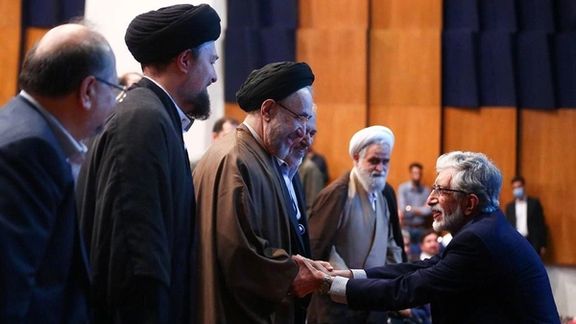
Iran's hardliner Paydari Party has dismissed long-time conservative figure Gholam-Ali Haddad-Adel's leadership of an umbrella group for a handshake with a moderate.
Paydari's break with the coalition occurred this week after long-time conservative figure Haddad-Adel shook hands with former reformist President Mohammad Khatami at a commemoration ceremony on Tuesday.
The former president has long been shunned by conservatives loyal to Supreme Leader Ali Khamenei. State media have even been barred from showing his image or say anything positive about him, although during eight years in office Khatami hardly challenged the authoritarian ruler.
Paydari used to join coalitions with other conservative parties ahead of almost all elections since mid 2000s, but it invariably left all coalitions at one point before an election and went its own separate way.
However, if Paydari stands on its word this time, it would be a first even for the notorious spoiler group eight months before the 2024 parliamentary vote.
Reformist newspaper Shargh called the development "a confrontation between radical and moderate conservatives," although Haddad-Adel can hardly be characterized as a moderate.
The development also revealed, though belatedly, why the host of the meeting, Hassan Khomeini, the grandson of the founder of the Islamic Republic Ayatollah Ruhollah Khomeini, had to apologize to an Iranian Labor News Agency (ILNA) reporter who was beaten up by his bodyguards and kept in a shed for several hours. The reporter was assaulted apparently when he tried to take photos of Haddad-Adel shaking hands with Khatami.
According to Sharq, Haddad-Adel was criticized by Paydari for remaining at the commemoration event after he found out that individuals such as Khatami and former Foreign Minister Mohammad Javad Zarif were also there. The hardliners said Haddad Adel should have done what Kayhan's firebrand editor Hossein Shariatmadari did. He left the session a few minutes after the opening speech by a reformist figure.
Shaking hands is nothing more than a sign of politeness and courtesy, wrote Shargh, but it was different for Paydari, because Haddad Adel and reformist figures were involved. That makes it a meeting which has something to do with elections and the rivalry between political factions.
Shargh pointed out that Haddad-Adel certainly knew beforehand that reformists will be present at the ceremony. It also reminded that Haddad-Adel was the first political figure to accuse Khatami as being one of the perpetrators of the post-election unrest in 2009 which led to his isolation on Iran's political scene. But apparently the old conservative leader thought a handshake was needed with the ex-president.
Hamid Rasaei, a Paydari figure wrote after the photo showing Haddad-Adel shaking hands that Khatami was "one of the leaders of the coup in 2009 and the ensuing seditions."
What Khamenei loyalists call a sedition was popular protests when Mahmoud Ahmadinejad was quickly declared the winner of the presidential election in 2009 in a highly disputed move.
Shargh further pointed out that the episode revealed that Iran's conservatives see the upcoming election in March as a game reserved only for their candidates where no reformist should be allowed to play.
As a further indication of that, Shargh noted that the Strategic Network of the Supporters of the Islamic Revolution [Persian acronym SHARIAN] ,another conservative coalition which is also close to Paydari has made it clear in a recent meeting that their list of candidates will include no so-called moderate conservatives.
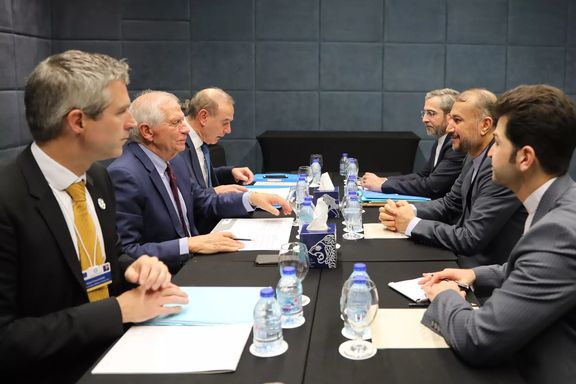
The United States and European powers have resumed discussions on how to interact with Iran over its nuclear program, according to the Financial Times.
Iran has enriched uranium to such levels that US officials have warned in recent months Tehran could produce enough fissile material for a nuclear weapon in less than two weeks.
“There is recognition that we need an active diplomatic plan to tackle Iran’s nuclear program, rather than allowing it to drift,” a western diplomat told the Financial Times.
The US, France, Germany and the UK halted diplomatic efforts to resolve the crisis last September after Tehran angered rejected a draft proposal by the European Union to revive the 2015 nuclear agreement.
According to the Financial Times, there have been contacts with Iranian officials in recent months, including a meeting between officials from the so-called E3 - France, Germany, and the UK - and Ali Bagheri Kani, Iran's nuclear negotiator.
Diplomats and analysts say Rob Malley, the US Iran envoy, has met several times with Iran’s UN ambassador in New York Amir Saeid Iravani.
A person close to the administration said the talks focused mainly on the possibility of an exchange of prisoners with Iran, which holds at least three US citizens.
Last week, Tehran agreed to exchange prisoners with Belgium and released two Austrians.
IAEA detected particles enriched to almost weapons grade at the Fordow nuclear plant in January, indicating Iran enriched at least some uranium to 84% purity.
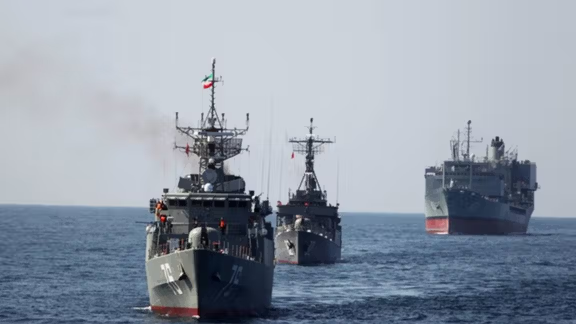
Iran's navy commander said Saturday his country and Saudi Arabia, as well as three other Persian Gulf states, plan to form a naval alliance, including India and Pakistan.
"The countries of the region have today realized that only cooperation with each other brings security to the area," Iranian army's navy commander Shahram Irani was quoted as saying.
Iranian media had mentioned a new naval alliance this week without providing any details. There have been no hints by other regional countries about such a development.
Iran's Revolutionary Guard also has a navy along with the army's maritime force.
However, the United Arab Emirates unexpectedly announced May 31 that it had withdrawn from the US-led 34-nation Combined Maritime Forces coalition, which if true, signals a further weakening of the US position in the Middle East.
The Combined Maritime Forces task force, headquartered at the US naval base in Bahrain, works on security, counterterrorism and counter-piracy in the Red Sea and the Persian Gulf areas. But in fact, the US and Israel were trying to forge a regional coalition to contain Iran, including an air defense network.
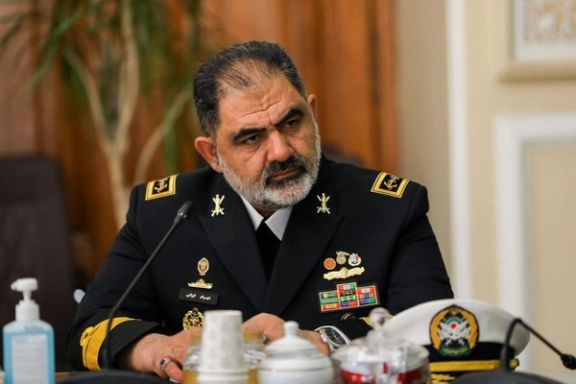
"As a result of our ongoing evaluation of effective security cooperation with all partners, two months ago, the UAE withdrew its participation in the Combined Maritime Forces," the Ministry of Foreign Affairs said in a statement.
However, the US 5th Fleet on June 1 politely refuted the UAE claim and said that the country was still a "partner" in the multinational coalition.
The Iranian navy commander did not elaborate on the shape of the alliance that he said would be formed soon.
Iran has recently been trying to mend its strained ties with several Persian Gulf Arab states.
In March, Saudi Arabia and Iran ended seven years of hostility under a China-mediated deal, stressing the need for regional stability and economic cooperation.
At the time the deal was seen as a shift in Saudi foreign and security policies that for decades has relied on the United States for protection in return for a steady flow of oil at reasonable prices.
Tehran rejoiced the agreement with Riyadh, with officials repeatedly proclaiming a great diplomatic victory against Washington and another step toward their proclaimed goal of “expelling America” from the region.
Naval commander Irani said the states that will take part in the alliance also include the United Arab Emirates (UAE), Bahrain, Qatar, Iraq, Pakistan, and India.
Iranian officials often make exaggerated claims to boost domestic morale and Irani’s claims have to be echoed by regional Arab countries to have any credibility.
The region contains some of the world's most important shipping routes where, since 2019, suspected Iranian attacks began against oil tankers amid tensions with the United States. The Obama, Trump and Biden administrations chose not to retaliate against Iranian naval provocations over the years or show a convincing military deterrent response.
In its latest provocation in May, Iran seized two oil tankers transiting between UAE ports.
Saudi Arabia's rapprochement with Iran has frustrated Israel's efforts to isolate Iran diplomatically.
The UAE, which was the first Persian Gulf Arab country to sign a normalization agreement with Israel in 2020, resumed formal relations with Iran last year.
Bahrain and Morocco later joined the UAE in establishing ties with Israel.
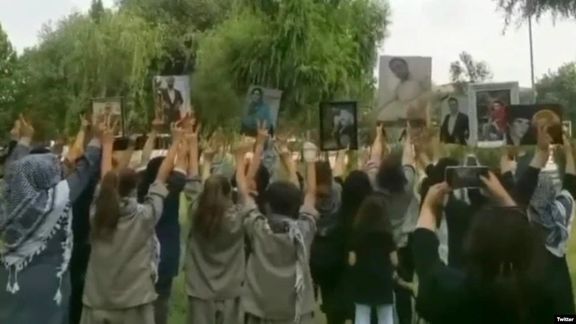
Iranians in the western city of Mahabad held a rally and chanted anti-government slogans to mark the 40th anniversary of the mass execution of 59 youths in the 1`980s.
Videos show security and law enforcement forces surrounded the cemetery of the city an hour before a scheduled ceremony and closed the entrances.
Although the roads to the cemetery were blocked, a group of people gathered near the location holding the pictures of those executed on June 2, 1983. They also carried the photos of those killed during “Woman, Life, Freedom” protests since September 2022.
The protesters chanted slogans like "The Dictator Is Afraid of Us" and "The Martyr Never Dies".
On June 2, 1983, the Iranian regime executed 59 people in the Kurdish-majority city of Mahabad for suspected opposition and based on unknown charges.
Since the establishment of Islamic republic, the regime has mounted massive military, economic, cultural, social and psychological pressures against ethnic Kurds.
Mahsa Amini who died after being arrested by the morality police in September 2022 for "improper hijab" was a 22-year-old Kurdish-Iranian woman. Her death ignited the largest and longest anti-regime nationwide protests in Iran.
The massacre of the prisoner took just a few minutes, while they had no chance to appeal for pardon while some of them were under 18.
The Islamic Republic calls the Kurdish armed groups in the western provinces of Iran, "terrorist groups" or "anti-revolutionary" but these groups say that the goal of their armed campaign is "defending the rights of the Kurds".
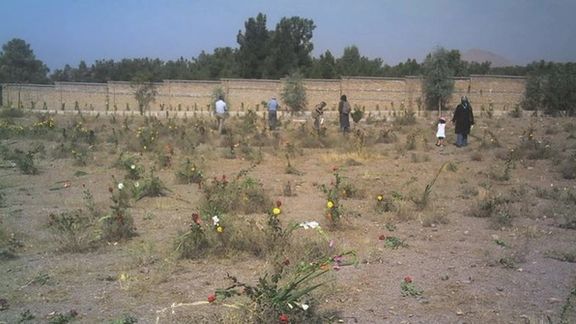
Iran’s ministry of intelligence has secretly buried another deceased Baha'i citizen without notifying the family or allowing a religious ceremony.
Human right groups reported on Saturday that the regime buried the Baha’i citizen without the consent of his family.
Based on the report, the relatives held the funeral ceremony behind closed doors on Friday.
Within the past months, activists of the Baha'i community and human rights organizations have repeatedly reported that Iranian government officials have buried some of the deceased in the Khavaran cemetery without the knowledge of their families.
The Khavaran cemetery in southeast Tehran is an unmarked mass graveyard where dozens of executed prisoners in the 1980s are buried.
Earlier, Iran Human Rights Organization quoted an informed source as saying that some people who are not from the Baha'i community are interfering in their religious practices.
Baha'i cemeteries in Iranian cities and villages have also been confiscated and destroyed, and new buildings have been constructed on the burial grounds to leave no traces of the remains of Baha'is.
The 1979 constitution of the Islamic Republic recognizes only Islam, Christianity, Judaism and Zoroastrianism. Supreme Leader Ali Khamenei has on several occasions called the Baha'i faith a cult and in a religious fatwa in 2018 forbade contact, including business dealings, with followers of the faith.
Baha'is, who number around 300,000 in Iran, say their rights are systematically violated and they are often harassed, forced to leave their homes and businesses, and are deprived of government jobs and university education.